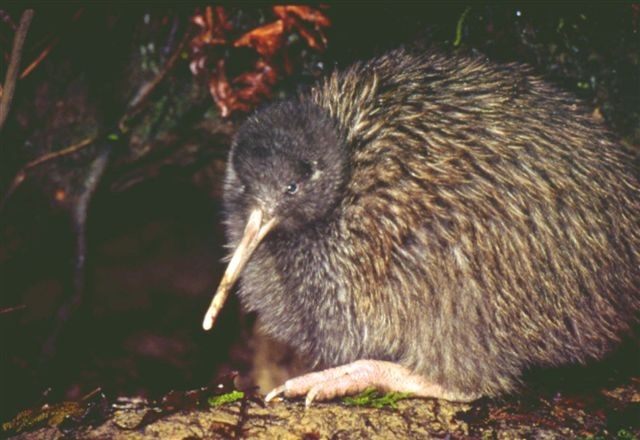Okarito Kiwi

| Okarito Kiwi | |
|---|---|
| Conservation status | |
| Scientific classification | |
| Kingdom: | Animalia |
| Phylum: | Chordata |
| Class: | Aves |
| Order: | Struthioniformes |
| Family: | Apterygidae |
| Genus: | Apteryx |
| Species: | A. rowi |
| Binomial name | |
| Apteryx rowi Tennyson et al., 2003 | |
The Okarito Kiwi, Apteryx rowi, also known as the Rowi or Okarito Brown Kiwi, is a member of the Kiwi family Apterygidae, described as new to science in 2003. The species is part of the Brown Kiwi complex, and is morphologically very similar to other members of that complex. It is found in a restricted area of the Okarito forest on the West Coast of New Zealand's South Island, and has a population of about only 300 birds. Some Okarito Brown Kiwis may live up to 100 years.
Taxonomy
The Okarito Kiwi is a monotypic species. Their genus name Apteryx stems from the Greek "without wings". This bird is a ratite and has similarities to the others (Emu, Ostrich, Rhea,Cassowary). Its sternum has no keel, its wings are minimal, and it has no preen gland. Its palate is also distinctive, and its feathers have no barbules or aftershaft. Other features that are similar to only the other kiwis is a weak gizzard and no tail, only a pygostyle.
Range and habitat
The Okarito Brown Kiwi lives in the Okarito forest on the West Coast of New Zealand's South Island. On the 29th of June 2010, three breeding pairs were released onto Blumine Island as part of a breeding program.
Reproduction
The female can lay up to three eggs, each in a different nest. Both the male and the female incubate the eggs. The egg is very large, as it weighs 20% of the female's weight (as in all kiwis). Most pairs are monogamous throughout their lives.
Status and conservation
Its conservation status has been set as "nationally critical". Conservation efforts such as Operation Nest Egg and the stoat control regime have been partially successful in restoring the Rowi population. However, the rowi is still in a fragile stage of existence. Predation, mainly from imported animals such as stoats, is still the biggest threat to the Rowi. The South Okarito Forest was designated a kiwi sanctuary in 2000.

No comments:
Post a Comment